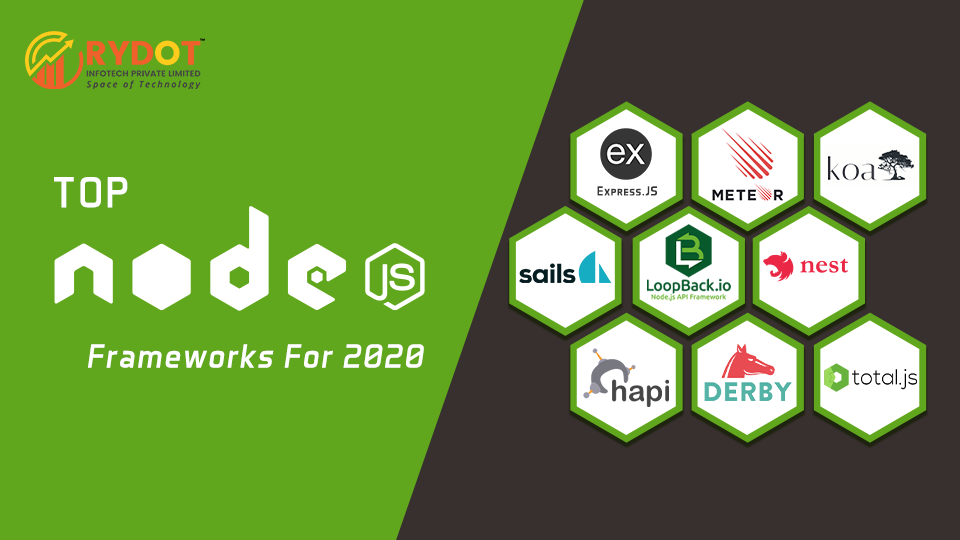![]()
A framework in simple language is a collection of coded libraries that forms the base of any modern application. Apart from libraries, there are many other features that a framework provides with a proper architecture like code maintainability, compiling, routing and feature-rich pre-compiled code blocks that can be used out of the box.
Node.JS frameworks are such feature-rich and powerful frameworks that offer developers the power to develop and maintain complex as well as huge enterprise applications with ease. Before this framework was introduced javascript developers were limited to writing only client-side coding, but now with so many new frameworks coming up developers can utilize the power of javascript for server-side coding as well.
Let’s take a look at the various Node.JS frameworks that are going to rule in 2020:
Express.JS
Express.JS is one of the most popular Node.JS frameworks out there. With a myriad set of features for web application and developing API’s it is obvious why it’s called the de facto standard server of the Node.JS framework. It is an open-source software which is developed under the MIT License.
Express.JS provides a fast and reliable way for developing, debugging and error logging along with a lot of other features which makes a developer’s life easy and the application really efficient and scalable.
Meteor.JS
If you are looking for a framework that offers end to end seamless cross-platform development then Meteor.JS is where your search ends. This framework boosts about using the same code for Web, Desktop, iOS, and Android, which cuts down the coding effort to 1/3rd of the time and lets you focus more on building new features.
With support for MongoDB as your back-end and features like life reload which reloads only specific DOM elements instead of the whole page you are confident to make your applications as interactive to the end-user as possible.
Koa.JS
Koa.JS is a very elegant and robust framework that builds upon Express.JS. This modern and futuristic framework incorporates very little code footprint and offers very sleek middleware. So that developers can work as quickly as possible.
You can even use different pluggable modules with Koa.JS to extend and customize your application according to the users’ needs.
Sails.JS
A framework that uses purely Javascript for all of its coding and which is built upon the MVC architecture is called Sails.JS. I doubt there are any other frameworks in the market that offer such support to Socket.IO along with supporting any type of database for the data access layer and topping it off with blueprints which help you to kick off your backend without even writing a single line of code.
Loopback.JS
If you have been watching over this framework very closely then you must have heard about the latest upgrade done on Loopback.JS about the new Loopback core that has been written in TypeScript/ES2017 which provides better extensibility and versatility to your applications. It supports cloud integration and different types of databases as well. Support for Angular.JS as your front end manager adds one more point towards using this framework for your next application.
Nest.JS
Nest brings in progressive design patterns to the JavaScript coders which are loosely coupled, very flexible and modular. This is built upon the Express.JS framework which gives it a solid foundation.
When you look at the features that Nest provides you might feel that this is the same as any other framework but the real magic is in the architecture of this framework which makes this more robust and interactive compared to other frameworks.
Hapi.JS
With over 11900 stars on Github, you can be quite sure that this is quite a stable framework. Hapi is a Node.JS framework used to build REST API’s. It is updated regularly with new and stable features which make it more trustworthy.
Also having an extensible library of official plugins makes sure that you don’t have to use any third-party plugins for some of the most crucial codes in your applications. Make sure you try out this cool framework in your next project.
Derby.JS
Derby is a full-stack framework that easily syncs data from client and server-side to give users the kind of smooth experience that they are looking for. This feature is called conflict resolution and if you are serious about development, I think you should surely check this one out.
Total.JS
This is quite a simple framework that comes up at the end of our list. As they say last but not least. As the name goes this framework provides a Total development experience. By total I mean capabilities like rapid-fire prototyping, supporting different databases like MongoDB and MySQL as well as NoSQL along with many others, responsiveness and the list goes on and on.
Total.JS is free for everyone and is under MIT License which makes it a totally open source project.
Conclusion
With such a range of frameworks offering a vast number of features and different styles of architecture, you can blindly trust Node.JS frameworks to build some of the best applications that you and your clients have ever seen. If you are new to Javascript based frameworks then I am sure this exhaustive list must have ignited a desire to learn about these frameworks and incorporate them into your development process.
New or veteran any developer will find these frameworks quite useful as they are feature-rich, easy to manage and use, scalable and very stable.

